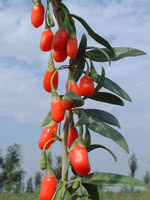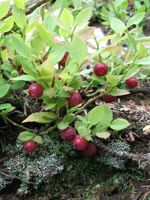Mon-Fri 9am - 5pm Mountain time
Goji Berry vs Grouseberry
Lycium barbarum
Vaccinium scoparium
NOT AVAILABLE THIS SEASON - MIGHT RETURN
CUSTOM GROW
Goji Berry is a woody, deciduous perennial known for its hearty, bright orange-red berries. It typically produces light lavender flowers from June through September, with fruit maturation taking place between August and October.
Goji Berry berries are delicious, nutrient rich, high in antioxidants, and are often called a super fruit. Many describe their flavour as being like a tart cherry tomato.
Grouseberry is a native, low-growing deciduous shrub known for its edible red berries. In early summer, it produces small, urn-shaped flowers ranging from white to pink that attract bees and other pollinators. The berries provide an important food source for many types of wildlife, including game birds such as grouse, which gives the plant its common name. People can also enjoy the berries fresh or in baked goods, though they can be difficult to harvest in large quantities.
Spreading by rhizomes, Grouseberry forms dense, broom-like mats that help stabilize soil and prevent erosion, while also providing cover for ground-nesting wildlife. It is commonly found beneath conifers in open forests, subalpine meadows, and occasionally on rocky slopes in mountainous regions. It is well-suited for naturalization, ecological restoration, and soil stabilization projects.

